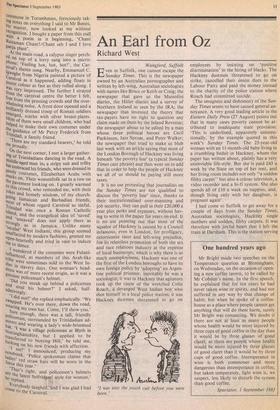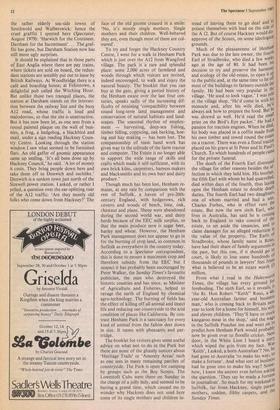An Earl from Oz
Richard West
WangJord, Suffolk ven in Suffolk, one cannot escape the
Sunday Times. This is the newspaper owned by an Australian pornographer and written by left-wing, Australian sociologists with names like Bruce or Keith or Craig; the newspaper that gave us the Mussolini diaries, the Hitler diaries and a survey of Northern Ireland as seen by the IRA; the newspaper that invented the theory that tax-payers have no right to question any claim made on them by the Inland Revenue; the newspaper about to be edited by a man whose three political heroes are Cecil Parkinson, lain Sproat, and Peter Walker; the newspaper that tried to make us blub last week with an article saying that most of the London Borough of Hackney was living beneath 'the poverty line' (a typical Sunday Times cant phrase) and then went on to add that in order to help the people of Hackney we all of us should be paying still more taxes.
It is no use protesting that journalists on the Sunday Times are not qualified to discuss the 'poverty line' since, thanks to their institutionalised over-manning and job security, they can pull in their £20,000 a year plus perks and expenses, without hav- ing to write in the paper for years on end. It is no use pointing out that most of the squalor of Hackney is caused by a Council infamous, even in London, for profligacy, extortionite rates and left-wing prejudice, for' its relentless promotion of both the sex and race relations industry at the expense of local businesses; which is why there is so much unemployment. Hackney was one of the first of the London boroughs to have its own foreign policy by 'adopting' an Argen- tine political prisoner, inevitably he was a sociologist; it was in Hackney that agitators took up the cause of the wretched Colin Roach, a deranged West Indian boy who shot himself in a local police station; it was Hackney dustmen threatened to go on '1 was into the youth cult before you were born.'
employees by insisting on 'positive discrimination' in the hiring of blacks. The Hackney dustmen threatened to go on strike, cancelled their union dues to the Labour Party and paid the money instead to the charity of the police station where Roach had committed suicide.
The smugness and dishonesty of the Sun- day Times seems to have caused general an- noyance. A very good leading article in the Eastern Daily Press (27 August) points out that in many cases poverty cannot be at- tributed to inadequate state provision: 'This is underlined, apparently uninten- tionally, by the example quoted in this week's Sunday Times. The 23-year-old woman with an 11-month-old baby living in a crumbling bedsit in Hackney, whom the paper has written about, plainly has a very unenviable life-style. But she is paid £43 a week by the State on top of her rent, and her living room includes not only "a sodden filthy carpet" but also a colour television, a video recorder and a hi-fi system. She also spends all of £10 a week on nappies, and, though living only with her daughter, is pregnant again'.
I had come to Suffolk to get away for a couple of days from the Sunday Times, Australian sociologists, Hackney single mothers and sodden, filthy carpets. It was therefore with joyful heart that 1 left the train at Darsham. This is the station serving
the rather elderly sea-side towns of Southwold and Walberswick: hence the cruel graffiti I spotted here (Spectator, August 1979): 'Harwich for the Continent.
Darsham for the Incontinent' The graf- fiti has gone, but Darsham Station now has still more ugly surprises.
It should be explained that in those parts of East Anglia where there are pay trains, where tickets are sold on board, the redun- dant stations are sensibly put out to lease by British Railways. At Woodbridge there is a café and boarding house; at Felixstowe, a delightful pub called the Witching Hour. But unlike those two tranquil places, the station at Darsham stands on the intersec- tion between the railway line and the busy Al2 road, whose traffic is loud and malodorous, so that the site is unattractive. But it has now been let, as one sees from a round painted plaque on the wall of bun- nies, a frog, a hedgehog, a blackbird and snail, under a sign reading Hackney Coun- try Centre. Looking through the station window I saw what seemed to be furnished. flats. An old gaffer of gnomic appearance came up smiling. 'It's all been done up by Hackney Council,' he said. 'A lot of money it costs. They bring people down here and take them off to Dunwich and suchlike.' Dunwich is a sunken town just north of the Sizewell power station. I asked, or rather I yelled, a question over the ear-splitting roar of the Al2 traffic: 'Are they mostly old folks who come down from Hackney?' The
face of the old gnome creased in a smile: `No, it's mostly single mothers. Single mothers and their children. Well-behaved they are, even though most of them are col- oured'.
To try and forget the Hackney Country Centre, I went for a walk in Henham Park which is just over the Al2 from Wangford village. The park is a rare and splendid place: some 2,000 acres of farmland and woods through which visitors are invited, indeed encouraged, to walk and enjoy the natural beauty. The booklet that you can buy at the gate, giving a potted history of the Henham estate over the last four cen- turies, speaks sadly of the increasing dif- ficulty of retaining 'compatibility between sound long-term land management and conservation of natural habitats and land- scapes. The seasonal rhythm of employ- ment — harvesting, deep-sea fishing, timber felling, coppicing, oak barking, hoe- ing and hay making — has been lost. The companionship of team hand work has given way to the solitude of the farm tractor and computer. The Estate is no longer able to support the wide range of skills and crafts which made it self-sufficient, with its own brick kilns, carpenters, harness makers and blacksmiths and its own beer and, dairy produce.'
Though much has been lost, Henbam re- mains, at any rate by comparison with the rest of Suffolk, a haven of pre-20th- century England, with hedgerows, rich coverts and woods of beech, lime, oak, chestnut and plane. Sheep were abandoned during the second world war, and dairy herds because of the EEC milk surplus, so that the main produce now is sugar beet, barley and wheat. However, the Henham Park management does not appear to go in for the burning of crop land, so common in Suffolk as everywhere in the country today. According to a Spectator correspondent, this is done to ensure a maximum crop and therefore subsidy from the EEC but I suspect it has probably been encouraged by Peter Walker, the Sunday Times's favourite politician, the man who destroyed the historic counties and has since, as Minister of Agriculture and Fisheries, helped to ravage the earth of England by chemical agro-technology. The burning of fields has the effect of killing off all animal and insect life and reducing our countryside to the arid condition of places like California. By con- trast Henham Park is a sanctuary for every kind of animal from the fallow deer down in size. It teems with pheasants and par- tridge.
The booklet for visitors gives some useful advice on what not to do in the Park but there are none of the ghastly notices about `Heritage Trails' or 'Amenity Areas' such as one sees in many remaining patches of countryside. The Park is open for camping by groups such as the Boy Scouts. The Lowestoft Cubs were there on Sunday in the charge of a jolly lady, and seemed to be having a grand time, which caused me to wonder why Hackney does not send here some of its single mothers and children in- stead of leaving them to go deaf and to poison themselves with lead on the side of the A 12. But of course Hackney would dis; approve of the Scouts, on some ideological grounds. Much of the pleasantness of Henhanl Park was due to the late owner, the fourth Earl of Stradbroke, who died a few weeks ago at the age of 80. It had been his decision to try and preserve the harmonY and ecology of the old. estate, to open it 111), to the public.and, at the same time to let oh most of the buildings to farmers outside the family. He had been very popular in the, village. 'He used to look vague,' I was told at the village shop. 'He'd come in with his monocle and, after his, wife died, he'd always ask how to prepare the food. But he was shrewd as well. He'd read the mai print on the Bird's Eye packet.' He had a passion for traction engines. When he died' his body was placed in a coffin made froth his own timber and towed round the estate on a tractor. There was even a floral tractor placed on his grave at St Peter and St Paul's Church. To which hundreds of people came for the private funeral. The death of the Fourth Earl distressed the village for other reasons besides the at'' fection in which they held him. His brother, the fifth Earl with whom he had quarrelled, died within days of the fourth, thus laying open the Henham estate to double death duties. The fourth Earl had two daughters, one of whom married and had a 501,11 Charles Forbes, who in effect runs the estate. But now the new sixth Earl, who lives in Australia, has said he is corning back to England to take control of the estate, to set aside the tenancies, and t° claim damages for an alleged reduction in, the value of the property. The Earls 01 Stradbroke, whose family name is Roos, have had their share of family arguments in the past, but this one, if it should go t°, court, is likely to lose some hundreds 01 thousands of pounds in lawyers' fees from what is believed to be an estate worth £5 million. From what I read in the Halesworth Times, the village has every ground for foreboding, The sixth Earl, so it reveals, is `the Rt. Hon Robert "Keith" Rous, a 4°' year-old Australian farmer and business man,' who is coming back to Britain next year to look for a home for himself, his wife and eleven children. 'They'll have to stock kangaroo meat in the shop,' said the wags in the Suffolk Poacher inn and went on 1.0 predict how Henham Park would probably now be given over to floodlit cricket. Next door, in the White Lion I heard a story which wiped the grin from my face. Was 'Keith', I asked, a born Australian'? No, be had gone to Australia 'to make his way, to make a fortune'. And what sort of business had he gone into to make his way? Some how, I knew the answer even before asking the question. 'They say he made a fortune in journalism'. So much for my weekend in Suffolk, far from Hackney, single parent mothers, sodden, filthy carpets, and the Sunday Times.



































 Previous page
Previous page